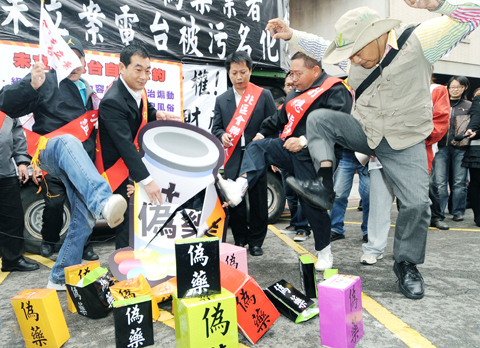Hundreds of illegal radio service operators petitioned the Legislative Yuan, Executive Yuan and National Communications Commission (NCC) yesterday, asking the government to stop a crackdown on illegal operators and to instead allow them to apply for legal operating licenses.
They also asked the government to reserve about 40 percent of the radio spectrum for unregistered radio operators, to be used by as many as 60 new operators.
The move came in the wake of a directive issued by Premier Wu Den-yih (吳敦義) earlier this month to crack down on fake and substandard medicine the government said is easily available on underground radio stations and Internet sites.

PHOTO: LIAO CHEN-HUEI, TAIPEI TIMES
Talking to Legislative Speaker Wang Jin-pyng (王金平) at the legislature, Chinese Internet and Multimedia Association chairman Hsu An-chin (?i) described the existence of underground radio stations as a “historical glitch” and called on the government to come up with measures to help the operators obtain legal licenses.
In response, Wang said the government decided to crack down on illegal stations because many advertise and sell counterfeit and controlled drugs, several of which have been linked to kidney failure and other health problems.
Wang said he hoped the NCC would look into ways to address the illegal operators’ desire to become legal and above board.
The protesters proceeded to the NCC at around 1pm yesterday where ten representatives, led by Hsu, met with the NCC officials and submitted their petitions.
NCC spokesperson Chen Jeng-chang (陳正倉) said the commission is amending the Broadcasting and Television Act (廣播電視法) because it wants to solve long-standing problems with the illegal radio services.
“Both the Presidential Office and the Executive Yuan are acutely aware of the fact that these illegal operators use public frequencies and the consequences of them doing so and want to settle this issue as soon as possible,” Chen said.
Noting that the radio spectrum is a public asset, Chen said the government must give out operational licenses according to existing laws.
“The law does not assign any frequency to anyone,” he continued. “Owners of illegal radio stations should file applications as soon as the commission promulgates new rules governing the issuance of operational licenses.”

ALIGNED THINKING: Taiwan and Japan have a mutual interest in trade, culture and engineering, and can work together for stability, Cho Jung-tai said Taiwan and Japan are two like-minded countries willing to work together to form a “safety barrier” in the Indo-Pacific region, Premier Cho Jung-tai (卓榮泰) yesterday said at the opening ceremony of the 35th Taiwan-Japan Modern Engineering and Technology Symposium in Taipei. Taiwan and Japan are close geographically and closer emotionally, he added. Citing the overflowing of a barrier lake in the Mataian River (馬太鞍溪) in September, Cho said the submersible water level sensors given by Japan during the disaster helped Taiwan monitor the lake’s water levels more accurately. Japan also provided a lot of vaccines early in the outbreak of the COVID-19 pandemic,

Kaohsiung Mayor Chen Chi-mai (陳其邁) on Monday announced light shows and themed traffic lights to welcome fans of South Korean pop group Twice to the port city. The group is to play Kaohsiung on Saturday as part of its “This Is For” world tour. It would be the group’s first performance in Taiwan since its debut 10 years ago. The all-female group consists of five South Koreans, three Japanese and Tainan’s Chou Tzu-yu (周子瑜), the first Taiwan-born and raised member of a South Korean girl group. To promote the group’s arrival, the city has been holding a series of events, including a pop-up

TEMPORAL/SPIRITUAL: Beijing’s claim that the next Buddhist leader must come from China is a heavy-handed political maneuver that will fall flat-faced, experts said China’s requirement that the Dalai Lama’s reincarnation to be born in China and approved by Beijing has drawn criticism, with experts at a forum in Taipei yesterday saying that if Beijing were to put forth its own Dalai Lama, the person would not be recognized by the Tibetan Buddhist community. The experts made a remarks at the two-day forum hosted by the Tibet Religious Foundation of His Holiness the Dalai Lama titled: “The Snow Land Forum: Finding Common Ground on Tibet.” China says it has the right to determine the Dalai Lama’s reincarnation, as it claims sovereignty over Tibet since ancient times,

Temperatures in some parts of Taiwan are expected to fall sharply to lows of 15°C later this week as seasonal northeasterly winds strengthen, the Central Weather Administration (CWA) said today. It is to be the strongest cold wave to affect northern Taiwan this autumn, while Chiayi County in the southwest and some parts of central Taiwan are likely to also see lower temperatures due to radiational cooling, which occurs under conditions of clear skies, light winds and dry weather, the CWA said. Across Taiwan, temperatures are to fall gradually this week, dropping to 15°C to 16°C in the early hours of Wednesday